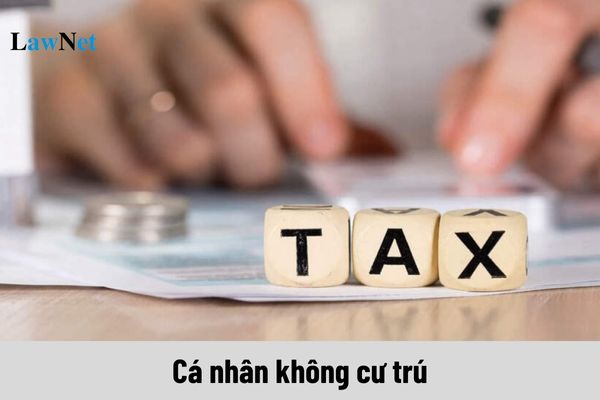Who is a Vietnamese non-resident? What is the scope of PIT liability for a non-resident?
Who is a Vietnamese non-resident?
Pursuant to Clauses 2 and 3, Article 2 of Decree 65/2013/ND-CP, a Vietnamese non-resident is understood to be an individual who does not fulfill any conditions to be considered a resident individual. Specifically, a Vietnamese non-resident is a person who:
- Is not present in Vietnam for 183 days or more in a calendar year or in 12 consecutive months from the first day of presence in Vietnam. An individual is considered present in Vietnam according to this regulation when physically present in the territory of Vietnam.
- Does not have a regular residence in Vietnam, defined as follows:
+ Not registered for permanent residence under the laws on residence.
+ Does not rent a home for residence in Vietnam with a lease term of 183 days or more during the taxable year.
Note: For individuals with a permanent residence in Vietnam but actually present in Vietnam for fewer than 183 days during the taxable year, and who cannot prove they are a resident of another country, they are still considered resident individuals in Vietnam.

Who is a Vietnamese non-resident? What is the scope of PIT liability for a non-resident? (Image from the Internet)
What is the scope of PIT liability for income of Vietnamese non-residents?
Pursuant to Article 2 of Decree 65/2013/ND-CP as follows:
Taxpayers
- Personal income taxpayers include resident individuals and Vietnamese non-residents with taxable income as stipulated in Article 3 of the Personal Income Tax Law and Article 3 of this Decree. The scope of taxable income determination for taxpayers is as follows:
a) For resident individuals, taxable income is income generated within and outside the territory of Vietnam, regardless of the place of income payment;
b) For Vietnamese non-residents, taxable income is income generated in Vietnam, regardless of the place of income payment.
2. A resident individual is a person meeting one of the following conditions:
a) Present in Vietnam for 183 days or more in a calendar year or in 12 consecutive months from the first day of presence in Vietnam;
An individual is considered present in Vietnam according to the provisions at this point by their presence on the territory of Vietnam.
b) Has a regular residence in Vietnam under one of the following two conditions:
- Has a registered permanent residence according to the provisions of residence law;
- Has rented a house for residence in Vietnam according to the housing law, with a lease term of 183 days or more during the taxable year.
In cases where an individual has a regular residence in Vietnam as per this provision but is actually present in Vietnam for fewer than 183 days in the taxable year, and cannot prove residence in another country, they are considered a resident in Vietnam.
3. A Vietnamese non-resident is one who does not meet the conditions stipulated in Clause 2 of this Article.
Vietnamese non-residents are liable for PIT on income sourced in Vietnam, regardless of the place of income payment.
Income generated outside the territory of Vietnam is not taxable, even if paid by organizations or individuals in Vietnam.
How is tax withheld for Vietnamese non-residents with income in Vietnam?
According to Article 28 of Decree 65/2013/ND-CP, tax withholding refers to the organization or individual paying the income to deduct the amount of tax to be paid from the taxpayer's income before it is paid out.
For the income of Vietnamese non-residents, including those not present in Vietnam, tax withholding of personal income tax is applicable.
According to Point a, Clause 1, Article 25 of Circular 111/2013/TT-BTC, organizations and individuals paying taxable incomes to Vietnamese non-residents are responsible for withholding personal income tax before paying the income.
The calculation of the withholding tax amount is conducted following detailed guidance from Article 17 to Article 23, Chapter III of Circular 111/2013/TT-BTC, specifically as follows:
(1) Income from business:
Withholding tax amount = Revenue × Tax rate.
* Applicable tax rates:
- 1%: Trading goods.
- 5%: Service business.
- 2%: Production, construction, transportation, and other sectors.
In cases where Vietnamese non-residents have revenue from various sectors, and cannot separately identify the revenue of each sector, the applicable personal income tax rate shall be the highest tax rate of the actual operational sector on the total revenue.
(2) Income from wages and salaries
Withholding tax amount = Taxable income × 20% tax rate.
(3) Income from capital investment
Withholding tax amount = Total income from investment × 5%.
(4) Income from capital transfer
Withholding tax amount = Transfer price × 0.1%.
(5) Income from real estate transfer
Withholding tax amount = Transfer price × 2%.
(6) Income from royalties
Withholding tax amount = (Income exceeding 10 million VND) × 5%.
(7) Income from franchising
Withholding tax amount = (Income exceeding 10 million VND) × 5%.
(8) Income from winnings, inheritance, gifts
Withholding tax amount = (Income exceeding 10 million VND) × 10%.
Note that Vietnamese non-residents are not eligible for deductions such as family allowances, mandatory insurance deductions, or other deductions. Consequently, the personal income tax is calculated directly on the total taxable income without any deductions.

